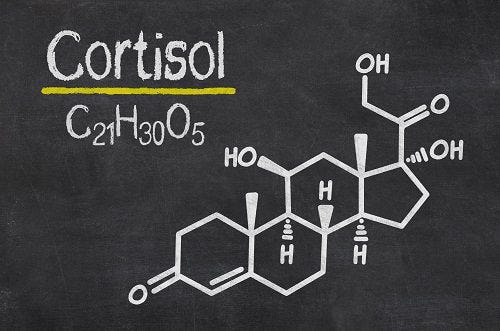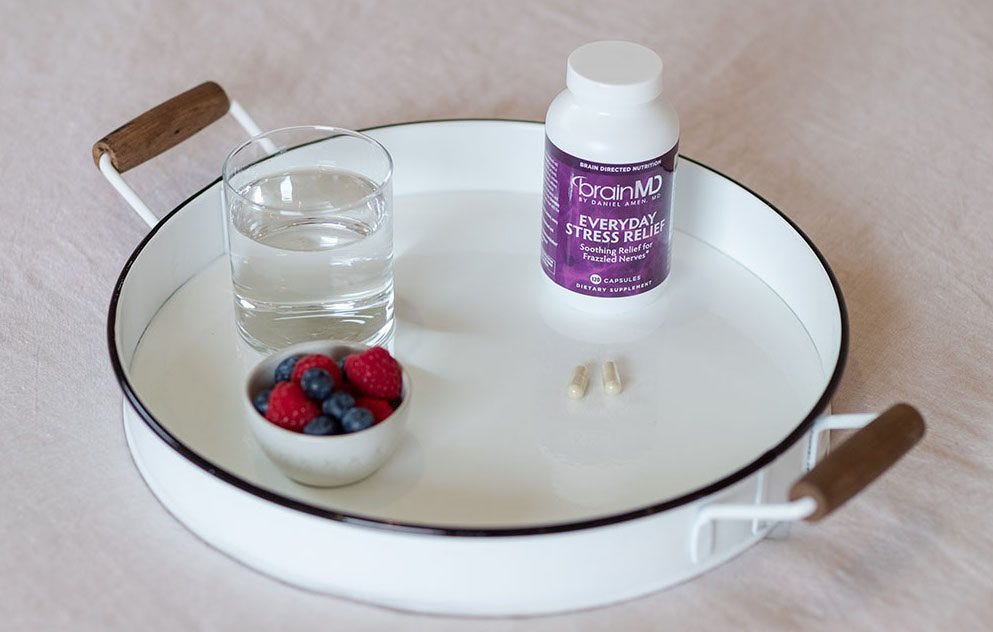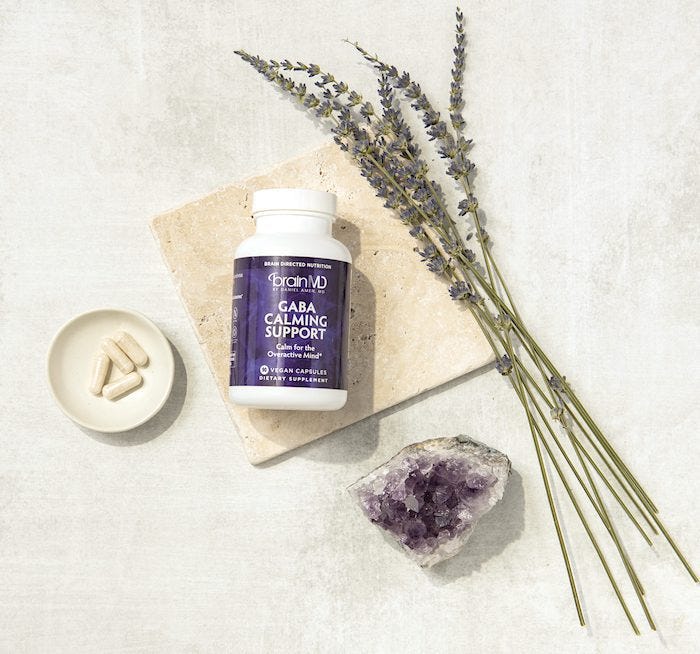Some of the Best Ways to Reduce the Stress Hormone Cortisol
Medically Reviewed by Dr. Parris Kidd
Stress is prevalent in our society.
A recent report from the American Psychological Association found that 84% of the people surveyed have been experiencing elevated levels of stress.
Additionally, almost half of them reported mood issues, as well as weight changes and problems with sleep – conditions that often accompany being emotionally overwhelmed.
Good Stress/Bad Stress
Usually, people think of stress as bad…but stress is both good and bad. A little bit of stress is actually good because it can motivate you to meet your goals. Low level stress also can help you with resilience, problem solving, and adapting to everyday challenges.
Stress becomes a problem when it’s intense, recurring, or remains unresolved over a sustained period. At that point, stress takes a toll and can become harmful to your health.
If left unchecked, excessive stress can lead to serious personal and social consequences, including:
- Family conflict
- Low self-esteem
- Disability
- Withdrawal from social activities
- Alcohol and substance abuse
- Legal and criminal problems
- Anxiousness and other mental problems
- Suicide
Fight or Flight
The body’s “fight or flight” system is for dealing with threats – whether real or perceived. When we sense danger, our brain’s hypothalamus immediately sends an alert to our body. The brain then triggers the adrenal glands to release a surge of hormones, including adrenaline.
Adrenaline increases your heart rate and blood pressure and provides a rush of energy to escape the danger. Another hormone involved in the fight or flight process is cortisol.
What Is the Stress Hormone Cortisol?

Cortisol is produced by the adrenal glands – triangle-shaped organs that sit on top of the kidneys. The hypothalamus and pituitary gland help regulate the amount of cortisol in the blood. Cortisol receptors, found in the many of the body’s cells, use the hormone in many ways.
For instance, if your body is placed on high alert, cortisol can temporarily shut down various bodily systems not needed in a fight or flight situation. These systems include the digestive, immune and reproductive systems. It also releases glucose to help repair damaged tissue.
Once the danger is averted, cortisol levels gradually normalize and heartbeat, blood pressure, and other body systems should return to normal. However, if the body is subjected to consistent stress, its cortisol can remain at high levels.
This can disrupt your body’s processes and create many health problems, such as:
- Brain problems
- Heart problems
- Headaches
- Mood issues
- Memory or concentration problems
- Weight gain
- Digestive issues
- Troubles sleeping
Not only can excessive stress lead to physical health problems, it can also disrupt your mental health.
So, what can you do if you’re dealing with too much stress? Here are some healthy strategies for reducing stress in your daily routine…
5 Natural Ways to Reduce the Stress Hormone Cortisol
Deep Breathing
Whenever you feel worried, frustrated, angry, or tense, do a deep breathing exercise. Focusing on your breathing for a few minutes is one of the simplest and quickest ways to settle your anxious or stressful thoughts.
Breathe with your diaphragm rather than your chest. Try this exercise:
- Inhale 3 to 4 seconds
- Exhale 6 to 8 seconds
- Repeat this pattern 10 times
When you slow down and become more efficient with your breathing, you may find that your problems aren’t as dire as you thought they were and that you’re feeling less stressed.
Canine Companion
Due to their natural ability to provide comfort, especially when you’re feeling stressed out, spending time with a dog can help your muscles relax, slow your breathing, and lower your heart rate. It also can help decrease levels of the stress hormone cortisol..
Overall, dogs can help you feel calmer. This effect is evident in the way trained service dogs can bring positivity to people who suffer with mood issues.
Having a dog provides companionship, which is especially helpful for anyone who lives alone or is often isolated from others. Petting a dog can help alleviate feelings of loneliness by letting you know you aren’t alone.
Spending time with your pet can help promote calmness by increasing levels of oxytocin and decreasing production of the stress hormone cortisol. Owning a pet that needs to be walked means you’ll get outside for fresh air and sunshine, which can lower your blood pressure, reduce your stress, and perhaps even help you lose weight.
Meditation
Scientific evidence shows that meditation can help calm anxiousness and stress and enhance brain function.
A randomized controlled trial involving 93 subjects with mood issues was published in JAMA Internal Medicine. The researchers found that those in a stress-reduction program that incorporated meditation had a greater improvement in anxiousness and stress along with an increase in positive self-statements compared to those in a stress management group without meditation.
Another group of researchers, who conducted a study with 40 college students, found that after only 5 days of meditation the participants had significantly lower levels of cortisol.
Social Connections
Never underestimate the importance of being around the right people. The health habits of the people you spend time with may have a dramatic impact on your own health and habits. So, surround yourself with people who are happy, upbeat, and kind.
Building and maintaining healthy relationships may help you feel understood and cared for. When you care for others and feel cared for, your brain can release oxytocin, the “bonding” hormone, which can counteract some of the negative effects of stress.
Nutritional Support
Nutrients and herbals can help support your body’s resistance to stress.
Everyday Stress Relief

Here’s what you’ll find in this high-potency formula:
- Magnesium is a well-known calming mineral. It promotes a balanced and mentally focused demeanor.
- The amino acid taurine supports the adrenal glands and is crucial for coping with stress.
- The herb holy basil, revered both in Europe and the East, helps to improve adaptation to occasional anxiety and other problems related to stress.
- A phytochemical derived from green tea, l-theanine helps to reduce tension.
- Relora®, which is a unique mix of two herbs, may enhance healthy management of the stress hormone cortisol while easing tension, anger, negative mood, and confusion.
This safe, non-sedating, and non-habit-forming formula combines the multiple beneficial actions of these well-studied herbs and nutrients to help your brain and body cope with stress on multiple levels.
GABA Calming Support

This soothing formula includes:
- GABA – is the body’s main calming neurotransmitter. By slowing the excessive firing of neurons, it supports the body’s natural mechanisms for quieting the mind and gradually falling asleep.
- L-Theanine – working mainly by way of GABA receptors on nerve cells, l-theanine is an amino acid that has calming and relaxing effects while preserving mental focus, and also improves sleep quality.
- Lemon balm (Melissa officinalis) – a member of the mint family that has been used as a medicinal herb for over 2000 years, lemon balm helps relieve stress and anxiousness, likely by increasing GABA activity in the brain as well as the activity of acetylcholine, a major neurotransmitter that promotes mental focus.
- Magnesium – sometimes called the relaxation mineral, magnesium plays important roles in relaxing mind and body, calming racing thoughts, and promoting overall sleep quality. Research suggests that magnesium’s calming effects are enhanced by vitamin B6.
- Vitamin B6 – vitamin B6 is required by brain enzymes that produce the neurotransmitter serotonin, which promotes relaxation and positive mood. This supplement provides B6 as pyridoxine and pyridoxal-5-phosphate, its most readily utilized forms.
GABA Calming Support boosts GABA to help relax your brainwaves and pump the brakes on anxious and fearful thoughts. As a gentle, natural relaxation aid, it has helped countless people transition from an agitated awake state into a restful state that allows them to transition into sleep.
Stress Less
These are just a few of the many practical and natural techniques that can keep your body’s production of the stress hormone cortisol in check. Adopting these healthy tips can help reduce stress levels and increase your inner calm.
If you feel stressed and need a nutritional boost, give Everyday Stress Relief and GABA Calming Support a try today.
At BrainMD, we’re dedicated to providing the highest purity nutrients to improve your physical health and overall well-being. For more information about our full list of brain healthy supplements, please visit us at BrainMD.
- This Is What You Need to Know About HBOT
Medically Reviewed by Dr. Nicole Avena - April 22, 2024 - Hormone Changes in Men: How to Know If You Have Low Testosterone! - April 15, 2024
- This Is What You Need to Know About EMDR Therapy! - April 11, 2024




Perfect Timing, Thank you!
I understand that for most people who are not dealing with a long term illness like Lyme disease, it is often a big focus to try to reduce HIGH CORTISOL LEVELS. But please be aware that once the adrenals become fried after years of dealing with high levels of stress, you do NOT want to try to lower cortisol levels with someone who is dealing with adrenal fatigue that can easily be tested for to prove that the adrenals can no longer successfully produce cortisol without nutritional support and help. Obviously, if someone’s adrenals are SHOT, then their cortisol levels will be TANKED OUT. Lab work done by a functional medical doctor or a naturopath can accurately test for this. Unfortunately, endocrinologists have ONLY been a sheer nightmare for me personally because once an endocrinologist discovered that early on, it appeared my cortisol levels were a little elevated, I was put on a steroid where I was told I would have to take the rest of my life! NEWS FLASH! This suppressed my immune system which played a HUGE ROLE in my body crashing when I came down with mono/EPSTEIN BARR VIRUS and literally prevented my immune system from being able to RECOVER. At that time, we were unaware I already had mostly dormant LYME DISEASE becoming less dormant by the day! THIS prevented my immune system from ever being able to fully recover from EBV/mono or Lyme disease that fully became activated! I’m sharing this 25 years LATER in the attempt to help someone out there being given inaccurate information by endocrinologists. I fully believed at the time that I was seeing one of the best endocrinologists in Nashville where I lived until my body fully crashed. You do NOT ever want to go to an endocrinologist because they are NOT correctly trained about “adrenal fatigue” and will literally fight anyone tooth and nail who disagrees with them when they say “adrenal fatigue” doesn’t exist! Take it from me. It is very possible had I never been put on a very long term steroid for a slightly elevated cortisol level, I possibly would have never had my 30s and 40s stolen from me due to my immune system being unable to fight off EBV/mono as well as mostly dormant Lyme disease that I was unaware I had until 8 years later when I was finally FULLY COMPLETELY diagnosed accurately. Unfortunately, it’s really tricky once someone with Lyme disease has gone 8 years incorrectly diagnosed and never properly treated for Lyme and Lyme co-infections as soon as symptoms begin to surface. At that point, antibiotics and extremely harsh malaria meds to address Babesia (Lyme co-infection) were way too late to actually be able to get me into remission. I’m aware that this is a lengthy comment, but please be sure if it appears that your adrenal gland is continuing to stay maxed out due to stress, that you get correctly tested to learn IF your cortisol levels are elevated or have flipped into becoming extremely fatigued to where your cortisol levels are staying extremely LOW. You don’t want to lower cortisol levels that are already VERY low. And whether your cortisol levels are elevated or extremely low (from being maxed out for years) please be aware that this can always be addressed nutritionally by a functional medicine doctor or a good naturopath specialist. Endocrinologists will be quick to get you on an RX without understanding that cortisol levels CAN ABSOLUTELY FLIP FROM BEING ELEVATED TO BEING EXTREMELY LOW. Adrenal fatigue that can eventually cause very low cortisol levels need to be supported often with medical grade nutritional supplements THAT only a knowledgeable holistic specialist will know how to correctly address. And here’s a quick FYI. IF you have an under active thyroid, FIRST ADDRESS your adrenal fatigue (often low cortisol levels) and you will find that THIS will normalize your thyroid levels. I really hope this helps someone and prevents them from having their life completely derailed.